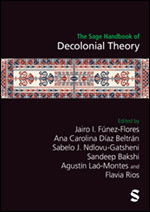The Sage Handbook of Decolonial Theory
- Jairo I. Fúnez-Flores - Texas Tech University, USA
- Ana Carolina Díaz Beltrán - University of Texas Rio Grande Valley
- Sabelo J. Ndlovu-Gatsheni - University of South Africa
- Sandeep Bakshi - Université Paris Cité
- Augustin Lao-Montes - University of Massachusets, Amherst, USA
- Flavia Rios - Fluminense Federal University, Brazil
The Sage Handbook of Decolonial Theory is a groundbreaking transdisciplinary resource that expands the epistemological and geographical horizons of decolonial thought. This handbook prioritizes the Global South, fostering South-North and South-South inter-epistemic dialogues and situating decolonial thought in sites of struggle. It builds on decolonial thought and praxis from Latin America and the Caribbean, Africa, Asia, and Palestine, among other regions and countries. Addressing the erasure of knowledge production from the Global South in dominant academic spaces, this handbook brings together decolonial scholars and activist intellectuals from the Global South and engages with politically committed scholars in the Global North. It emphasizes the geopolitics and ethics of knowledge production and the importance of situating one’s work in historically excluded regions and communities.
Organized into five parts, the handbook includes conceptual essays and empirical studies on decolonial thought and praxis. It covers a range of topics from (de)coloniality, geopolitics, and transdisciplinarity to decolonial feminisms, gender and sexuality studies, and racial capitalism. The chapters convey a sense of urgency and a committed political voice, demonstrating how decolonial theory can interrogate and intervene in the modern/colonial racial capitalist heteropatriarchal world.
The Sage Handbook of Decolonial Theory is not just for academics; it is written for anyone interested in radical thought and praxis. It recognizes decolonial theory as a plural and dynamic field, concerned with power hierarchies, historiography, and epistemological critiques of Eurocentrism. Ultimately, it teaches us how to think with and act alongside struggles for liberation.
Part I: Key Debates in Decolonial Theory
Part II: Geopolitics and Geographies
Part III: Transdisciplinarity
Part IV: Feminisms, Genders, & Sexualities
Part V: Racial Capitalism
The Sage Handbook of Decolonial Theory is a vital and urgent contribution to the ongoing struggles for liberation across the Global South and beyond. This volume resists the erasure of politically grounded knowledge and affirms the epistemic centrality of Indigenous, Black, Latinx, and Palestinian thought and praxis in the fight against racial capitalism, settler colonialism, and heteropatriarchy. As the Palestinian Feminist Collective, we recognize this work as part of a larger struggle to dismantle the structures that sustain oppression and dispossession. We celebrate this Handbook for its commitment to inter-epistemic dialogue, its refusal to accommodate colonial knowledge production, and its insistence on theory as action—rooted in the lived realities of those resisting empire. Everyone engaged in academic organizing must read this book; it is an essential resource for scholars and activists committed to decolonial thought and practice.
This brilliantly conceptualized collection brings together a plurality of differently situated decolonial theories, analyses, empirics, and material practices, around the axes of the coloniality of power, of knowledge, of being, and of gender. It vastly opens up current discussions about relations of power, discourse, material conditions, and the many kinds and dimensions of political resistance, in important new ways. This astonishing transdisciplinary book will become a classic, indeed required reading, for the field.

